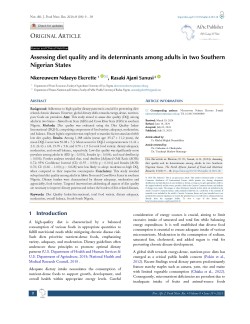Main Article Content
Assessing diet quality and its determinants among adults in two Southern Nigerian States
Abstract
Background: Adherence to high-quality dietary patterns is crucial for preventing diet-related chronic diseases. However, global dietary shifts towards energy-dense, nutrient-poor foods are prevalent.
Aim: This study aimed to assess diet quality (DQ) among adults in two States – Akwa Ibom State (AKS) and Cross River State (CRS) in southern Nigeria.
Methods: Diet quality was evaluated using the Diet Quality Index-International (DQI-I), comprising components of food variety, adequacy, moderation, and balance. Binary logistic regression was employed to examine factors associated with low diet quality.
Results. Among 1,188 adults (mean age: 35.47 ± 11.2 years), the mean DQI-I score was 56.08 ± 7.3. Mean scores for DQI-I components were 11.24 ± 3.9, 24.43 ± 4.8, 19.70 ± 5.8, and 0.70 ± 1.5 for total food variety, dietary adequacy, moderation, and overall balance, respectively. Low diet quality was significantly more prevalent among adults in AKS (p = 0.001), females (p = 0.034), and rural dwellers (p = 0.003). Further analyses revealed that, rural dwellers [Adjusted Odd Ratio (AOR): 0.72; 95% Confidence Interval (CI): (0.55 – 0.93); p = 0.014] and females [AOR: 0.76; CI: (0.60 – 1.00); p = 0.028] were less likely to adopt moderate-to-high DQ, when compared to their respective counterparts.
Conclusion: This study revealed suboptimal diet quality among adults in Akwa Ibom and Cross River States in southern Nigeria. Dietary intakes were characterized by dietary adequacy, moderation and appreciably, food variety. Targeted interventions addressing all aspects of diet quality are necessary to improve dietary patterns and reduce the burden of diet-related diseases.







